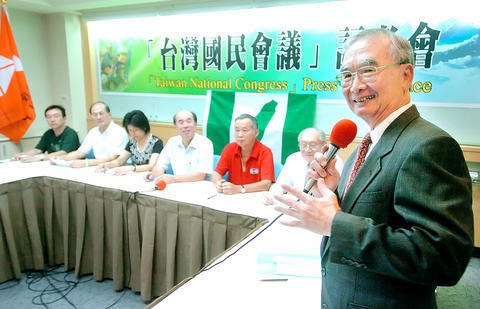A new pro-independence coalition yesterday vowed to push referendums on changing the name of the country and repeal the Referendum Law (公投法) next year in conjunction with the presidential election.
The Taiwan National Congress (TNC), formed by over 20 local and international pro-independence groups last Wednesday, said it hopes to push for a referendum on changing the country's official name from the Republic of China to Taiwan and another referendum on invalidating the Referendum Law, because "the high thresholds deprive Taiwanese of the ability to exercise their democratic rights."
The law stipulates that a successful petition for a referendum requires 0.5 percent of eligible voters who took part in the most recent presidential election to sign it -- about 80,000 people. In addition, signatures of 5 percent of the number of voters in the nation, or approximately 800,000 people, are needed before the petition can be screened by the Referendum Review Committee.

PHOTO: WANG MIN-WEI, TAIPEI TIMES
The law also prohibits people from initiating more than one referendum on the same topic within a three year period if the initial referendum fails to win support from the public.
TNC spokesman Ted Lau (劉重義) told a press conference yesterday that the congress would not follow the procedures stipulated in the Referendum Law to mount the two referendums and would declare its referendums successful if more than half of the voters agree.
It also plans to invite international experts to supervise the process and to ensure the referendums are conducted in a fair and transparent manner, Lau said.
Whether such referendums, carried out without reference to the legal mechanisms, would have any meaning if they were passed, Lau could not say but asked "is Taiwan a country governed by the rule of law?"
He said the group's intention was not to make Taiwan a lawless nation as the "Chinese Party [Chinese Nationalist Party [KMT]] have already done that."
Coalition secretary-general Hsu Fu-tong (
Through the referendums, Hsu said, Taiwan could tell the world exactly what the people want.
Lau said their short-term goal is to establish a mechanism whereby the public can have a direct say on major issues and veto legislation that it deems "inappropriate."
Their intermediate goal is to abolish the Legislative Yuan and the ultimate goal is to establish a "new and independent country," he said.

The disruption of 941 flights in and out of Taiwan due to China’s large-scale military exercises was no accident, but rather the result of a “quasi-blockade” used to simulate creating the air and sea routes needed for an amphibious landing, a military expert said. The disruptions occurred on Tuesday and lasted about 10 hours as China conducted live-fire drills in the Taiwan Strait. The Civil Aviation Administration (CAA) said the exercises affected 857 international flights and 84 domestic flights, affecting more than 100,000 travelers. Su Tzu-yun (蘇紫雲), a research fellow at the government-sponsored Institute for National Defense and Security Research, said the air

Taiwan is to commence mass production of the Tien Kung (天弓, “Sky Bow”) III, IV and V missiles by the second quarter of this year if the legislature approves the government’s NT$1.25 trillion (US$39.78 billion) special defense budget, an official said yesterday. Commenting on condition of anonymity, a defense official with knowledge of the matter said that the advanced systems are expected to provide crucial capabilities against ballistic and cruise missiles for the proposed “T-Dome,” an advanced, multi-layered air defense network. The Tien Kung III is an air defense missile with a maximum interception altitude of 35km. The Tien Kung IV and V

Trips for more than 100,000 international and domestic air travelers could be disrupted as China launches a military exercise around Taiwan today, Taiwan’s Civil Aviation Administration (CAA) said yesterday. The exercise could affect nearly 900 flights scheduled to enter the Taipei Flight Information Region (FIR) during the exercise window, it added. A notice issued by the Chinese Civil Aviation Administration showed there would be seven temporary zones around the Taiwan Strait which would be used for live-fire exercises, lasting from 8am to 6pm today. All aircraft are prohibited from entering during exercise, it says. Taipei FIR has 14 international air routes and

Taiwan lacks effective and cost-efficient armaments to intercept rockets, making the planned “T-Dome” interception system necessary, two experts said on Tuesday. The concerns were raised after China’s military fired two waves of rockets during live-fire drills around Taiwan on Tuesday, part of two-day exercises code-named “Justice Mission 2025.” The first wave involved 17 rockets launched at 9am from Pingtan in China’s Fujian Province, according to Lieutenant General Hsieh Jih-sheng (謝日升) of the Office of the Deputy Chief of the General Staff for Intelligence at the Ministry of National Defense. Those rockets landed 70 nautical miles (129.6km) northeast of Keelung without flying over Taiwan,